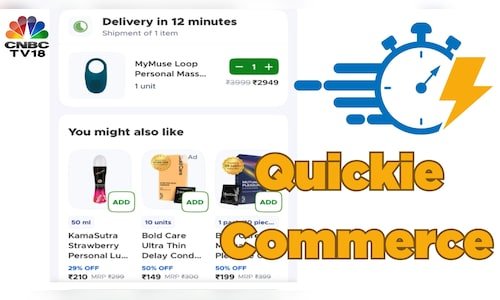Quickie commerce: Sex toys ride the impulse wave

Easing access and receding stigma have helped the sales zoom. Platforms like Blinkit, Zepto, and Swiggy now discreetly deliver Toys and tools for sexual pleasure, alongside groceries and electronics.
The 11-year-old portal IMBesharam — which is a marketplace for makers of products for sexual pleasure — expects ₹30 crore in revenue in the calendar year 2024, 25% more than a year earlier, and triple that of the figure in 2019. What’s better, the money is flowing in with a juicy margin of 25% to 50% on most product categories, according to the founder Raj Armani.
“The ability to go from imagination to initiation and then, to gratification, all under 20 mins, has improved conversions by over five times. The conversion rates are 40-45% in quick commerce players compared to 4-6% in traditional online marketplaces and 1-2% on direct-to-consumer websites,” the Atlanta-based Armani told CNBC-TV18.
While the products come from all over the world, all of Armani’s sales are within India. IMBesharam stocks inventory and uses local channels including platforms like Swiggy, Blinkit and Zepto for distribution.
It also helps that the products are packaged as massagers or other wellness products, as observed by a recent Bombay High Court judgement. The buyer sitting at home can’t be caught or harassed by cops on the street for, say, alleged “obscenity”.
And, the rising demand for sexual appliances is not just a big city phenomenon. Some of IMBesharam’s high-value customers are in Chandigarh, Jaipur, Trivandrum, Visakhapatnam, Indore, Ahmedabad, Amritsar and Patna.
Usually quick commerce companies keep inventory average 2 weeks worth of volumes based on the trend in the preceding month.
The story of the boom in India’s sexual pleasure industry reflects changing social norms, too, partly enabled by the rise of female influencers like Dr Tanaya, Pallavi Barnwal, Tanisha, Uorfi, Kusha Kapila who have normalised conversations about pleasure and sexual wellness.
“As a result of social media, overall wokeness, and availability of pleasure products, this audience is owning up to who they are and demanding what they need. They are curious, they are confident, they are bold and they are looking for premium quality products for their pleasure needs,” Armani added. The influencers remain the biggest marketers for the category and the buyers are largely aged between 20 and 40, and digital natives.
A whole host of new brands like LoveDepot, MyMuse, Sangya Project, Leezus, That Sassy Thing, The Sassiest, Manzuri, and LoveTreats, to name a few, have broken ground in the last few years. Even legacy corporations like TTK Healthcare and Reckitt have entered the market with their own brands, LoveDepot and Durex Toys respectively.
This increased competition is driving innovation in the category. Sangya Project, for instance, has introduced more than eight different models of vibrators, massagers, and plugs that are conceptualised, designed, and manufactured in India.
ALSO WATCH: This Company Is Making Sex Toys In India | Sangya Project
It’s still a very young and small industry but with a huge potential. Three things determine the success of any product: access, acceptance, and affordability.
The pleasure industry is not widely covered and therefore credible estimates aren’t easily available. While Armani estimates the current size of the industry at $25-30 million, an online platform called TechSci Research pegged the size of the pleasure industry at $112 million in 2023 growing at a CAGR of 15%.
Nonetheless, if the current momentum continues, it is fair to assume that that market could be many times bigger, given the huge population of young people. Pew Research estimated that more than 40% of India’s 1.4 billion people are under the age of 25.
ALSO READ: Pleasure economy | Sex, toys and the million-buck feeling








